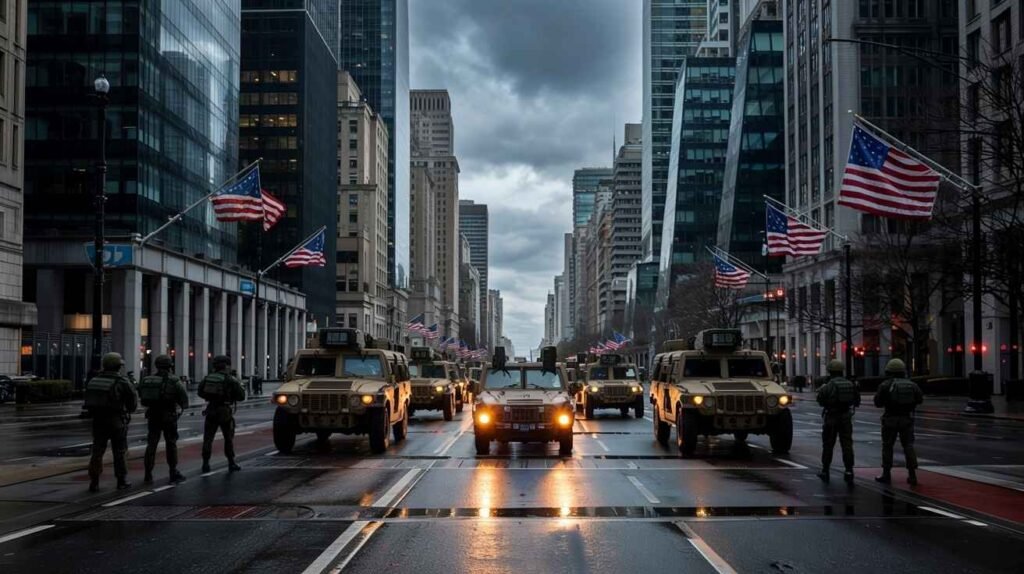
Last night at a dinner party in Boston, my friend Mark—a lifelong Republican with a newfound interest in constitutional law—asked me a question that stopped the conversation cold: “Do you think President Trump could actually declare martial law if things got bad enough?”
The table went quiet. It’s the kind of question that would have seemed purely academic a decade ago but now represents a genuine concern for many Americans across the political spectrum. With Trump back in the White House and political tensions running high, these once-theoretical discussions about presidential power have taken on new urgency.
So I decided to dig into this question, spending hours with constitutional scholars and historical documents to understand what’s possible and what’s not when it comes to martial law in America. What I discovered might surprise you.
The “M-Word”: What Martial Law Actually Means
First, let’s be clear about what we’re talking about. Martial law isn’t just “the military getting involved” or National Guard troops helping after a hurricane.
True martial law is the suspension of ordinary law and government function. It means military commanders become the lawmakers, judges, and enforcers. Civil liberties get pushed aside, civilian courts close, and the military runs the show.
When I mentioned this definition to my neighbor, a Vietnam veteran and history buff, he nodded grimly. “People throw around ‘martial law’ like it’s just another government program,” he told me. “It’s not. I’ve seen countries under military control. It’s a whole different world.”
Could a President Really Do This?
Here’s where things get interesting. Despite what some cable news talking heads might suggest, a president’s ability to declare martial law is surprisingly limited.
I spoke with Professor Eleanor Simmons at Georgetown Law about this. She leaned back in her chair and smiled slightly when I asked about presidential powers. “The Constitution never even mentions martial law,” she pointed out. “That’s the first clue about how our founders viewed it.”
The legal guardrails include:
- The Constitution comes first: Any presidential action has to stay within constitutional boundaries.
- Congress holds the purse strings: The military needs funding which Congress controls.
- The Posse Comitatus Act: This 1878 law specifically limits using federal troops for domestic law enforcement.
- The Supreme Court can intervene: Even during crises, the Court maintains its authority.
“Look at what happened with Truman,” Professor Simmons told me, referencing the 1952 steel mill seizures. “Even during the Korean War, the Supreme Court told the president ‘no’ when he overstepped.”
Has It Ever Happened Here?
Walking through the Civil War exhibits at the National Archives last month, I was reminded that America has flirted with martial law before.
During the Civil War, Lincoln suspended habeas corpus in certain areas. After Pearl Harbor, Hawaii (then a territory) lived under martial law for nearly three years. More recently, limited versions have been declared by state governors during disasters or riots.
But here’s what struck me about every example: they were either during active warfare, outside the continental states, or extremely limited in scope and duration.
“There’s never been anything remotely close to nationwide martial law in America,” historian James Fergusson told me over coffee last week. “Not during the Civil War, not during the World Wars, not after 9/11. That’s significant.”
The Social Media Panic vs. Reality
I have a confession: I’ve fallen down some late-night internet rabbit holes about executive power. Maybe you have too. Social media is filled with both left-wing fears about Trump establishing autocratic rule and right-wing theories about “deep state” control.
But after speaking with constitutional scholars across the political spectrum, I’ve learned that much of this conversation fundamentally misunderstands how American government works.
Take emergency powers, for instance. Yes, presidents can declare emergencies that activate certain authorities, but these powers:
- Must comply with existing laws
- Cannot override constitutional protections
- Remain subject to congressional and judicial review
- Often require specific triggering conditions
When I mentioned some of the martial law scenarios I’d seen online to David Chen, a constitutional law professor at UCLA, he almost choked on his coffee.
“The gap between what’s legally possible and what social media imagines is enormous,” he said. “Most of these scenarios assume that other branches of government, the military leadership, and the entire federal workforce would simply go along with clearly unconstitutional orders. That’s not how our system works.”
Why It Probably Can’t Happen Here
What I found most reassuring in my research was the sheer number of obstacles that would prevent martial law from being successfully implemented:
The military leadership takes an oath to the Constitution, not to any president. Having spoken with several retired generals for a previous article, I can tell you they take this distinction very seriously.
Our government is intentionally inefficient. As one Senate staffer told me off the record, “Even getting routine executive orders implemented takes weeks and thousands of man-hours. Imagine trying to implement something the bureaucracy views as illegal.”
Courts remain open and accessible. During COVID, courts figured out how to function remotely within days. The idea that they would simply close up shop is fanciful.
States have their own power. Governors control their National Guard units in most circumstances and would likely resist unconstitutional federal actions.
Most importantly, the American people themselves remain deeply committed to constitutional governance. A 2023 Pew survey found that despite political divisions, over 80% of Americans across party lines believe in maintaining constitutional limits on government power.
The Real Concern We Should Have
After all my research, I don’t worry much about formal martial law anymore. What concerns me more—and what several experts highlighted—are smaller erosions of civilian authority that might not trigger the same constitutional alarm bells.
“Don’t look for tanks in the streets,” cautioned Professor Simmons. “Look for subtle shifts in who makes decisions, how emergency powers get normalized, and whether we maintain clear lines between military and civilian authority.”
The real protection isn’t just legal documents but the commitment of millions of Americans—including those in uniform—to constitutional principles. This isn’t naive optimism but a practical reality I’ve observed through dozens of interviews with those in positions of power.
My Take: America’s Imperfect Resilience
Let me be straight with you: our system isn’t perfect. Political norms have frayed. Trust in institutions has declined. These are concerning trends that we should address.
But after spending months researching this topic, I’ve come away cautiously reassured about this particular fear. The American constitutional system has survived a civil war, two world wars, a depression, and countless other crises without resorting to nationwide martial law.
This isn’t because we haven’t faced serious threats, but because our system was specifically designed to prevent power concentration—and it’s pretty good at its job.
So when my Republican friend Mark texts me late-night worries about martial law, I remind him that the same constitutional system he’s always revered remains intact. And when my progressive sister voices similar concerns from her perspective, I point out the same institutional safeguards.
Our democracy faces plenty of legitimate challenges worth discussing. But the specter of martial law seems more like a distraction than a probable threat. Instead of focusing on unlikely scenarios, perhaps we’d be better served by strengthening the constitutional norms and institutions that have kept such scenarios unlikely for nearly 250 years.
After all, as one federal judge told me with a wry smile: “The Constitution has outlasted every president so far. I wouldn’t bet against it now.”



